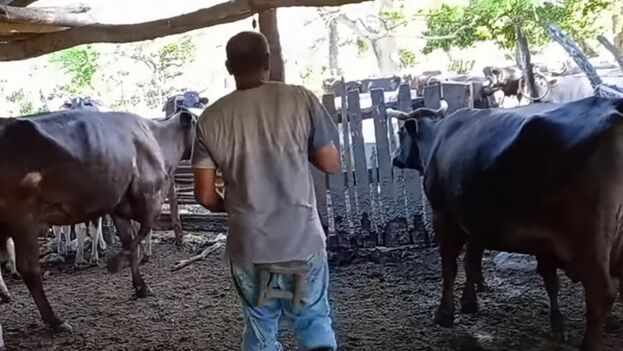
![]() 14ymedio, Havana, 12 December 2022 — Without knowing exactly why, satisfaction reigned in the parliamentary agro-food commission for the announced Law on the Promotion and Development of Livestock, which in recent days has been the focus of several reports in the local press. The preliminary draft, without any real innovations, can influence the pressing problem of shortages in the country. The new regulations essentially foresee changes in terms of sustainability, animal welfare and meat quality control that are more typical of countries where there is meat, which is far from being the case in Cuba.
14ymedio, Havana, 12 December 2022 — Without knowing exactly why, satisfaction reigned in the parliamentary agro-food commission for the announced Law on the Promotion and Development of Livestock, which in recent days has been the focus of several reports in the local press. The preliminary draft, without any real innovations, can influence the pressing problem of shortages in the country. The new regulations essentially foresee changes in terms of sustainability, animal welfare and meat quality control that are more typical of countries where there is meat, which is far from being the case in Cuba.
The session confirmed, in fact, that the changes that have been introduced so far to improve agricultural and livestock production have failed. “The measures and agreements are not complied with in practice, and this affects producers and makes us lose credibility,” said Emilio Interián Rodríguez, deputy for Arroyo Naranjo and a rancher himself, who urged an “immediate solution” to the problem of non-payments to producers. “Farming families depend on those profits; in addition, non-payments discourage production,” he lamented. And he didn’t have to go far to give an example.
“I recently sent three animals to the slaughterhouse, and I still don’t know when I’m going to collect that money. On the other hand, to buy a stallion, necessary to improve livestock, I must pay in cash. So, how do I do it? It’s not possible to move forward in agriculture like this,” he said, recounting his own experience.
The vice president, Salvador Valdés Mesa, recognized that Cuban laws are insufficient for the promotion of production and that, in addition, resources have not “been put” into it, but there have been recent transformations such as allowing the sale of livestock “and the privatization of part of the sector.” He forgot that there has been money for other issues and that, as the deputy of Arroyo Naranjo reminded him, the changes are of no use if there are no effects beyond the on-paper ones.
Valdés Mesa, in any case, was not very convinced about the innovations, judging by his words. “The state’s control over livestock is weakened. We have disorder in the field. There are many complaints from producers about the damage from animals to other crops and thousands of livestock holders without land,” he said.
As outlined in the commission, reality has forced some changes in the preliminary draft, although we will have to wait to see the final text to learn more. “There are elements related to food and nutrition, for example, that cannot be met, because not even companies have that capacity. Only universities and scientific centres have it,” said the authorities, who aspire to increase the amount of livestock, something that, they admit, they won’t achieve.
“In the country, 40,000 cattle are killed illegally, and 200,000 die,” a producer told Escambray on Wednesday in a report where nothing was hidden about the serious situation. “In livestock, life cannot remain the same, applauding plans and results that barely benefit a small number of inhabitants, recycling, year after year, statistics that make society shudder.”
According to the text, among the worst problems are banditry, which, he explains, forces cows to be cooped up for too long, and emigration, which additionally causes a lack of attention to rural communities and the countryside in general.
The report follows another one published days earlier in Periódico 26, which warned that, in the province of Las Tunas, there were more than 11,500 deaths of livestock in the year, and the planned birth rate didn’t even reach 41%. In addition, and delving into the serious problem of robberies that shakes the Island more than ever, it indicated that some 2,580 cows left the production cycle due to theft and illegal slaughter.
Milk is also affected, and according to the territorial authorities, deliveries of this product and meat have not been fulfilled, and contracts for production in 2023 do not even reach 14%. The issue is not trivial, since as long as the producer doesn’t fulfill his contract with the State, he cannot sell independently. Minister Ydael Pérez Brito said that, out of more than 9,000 owners, only about 256 animals are slaughtered, and added that the measures taken by the Government are intended to “woo the producers.”
Translated by Regina Anavy
____________
COLLABORATE WITH OUR WORK: The 14ymedio team is committed to practicing serious journalism that reflects Cuba’s reality in all its depth. Thank you for joining us on this long journey. We invite you to continue supporting us by becoming a member of 14ymedio now. Together we can continue transforming journalism in Cuba.
